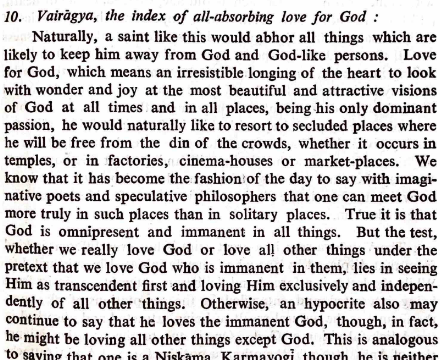Naturally, a saint like this would abhor all things which are likely to keep him away from God and God-like persons. Love for God, which means an irresistible longing of the heart to look with wonder and joy at the most beautiful and attractive visions of God at all times and in all places, being his only dominant passion, he would naturally like to resort to secluded places where he will be free from the din of the crowds, whether it occurs in temples, or in factories, cinema-houses or market-places. We know that it has become the fashion of the day to say with imaginative poets and speculative philosophers that one can meet God more truly in such places than in solitary places. True it is that God is omnipresent and immanent in all things. But the test, whether we really love God or love all other things under the pretext that we love God who is immanent in them, lies in seeing Him as transcendent first and loving Him exclusively and independently of all other things. Otherwise, an hypocrite also may continue to say that he loves the immanent God, though, in fact, he might be loving all other things except God. This is analogous to saying that one is a Niskāma Karmayogi though he is neither a tyagi (non-attached to the fruits of actions) nor a sannyasin (renouncer of all actions). If a person can really renounce the fruits with perfect calmness of mind, will it be impossible for him to renounce sometimes at least the actions as also the desires for fruits which act as the motives of the actions? As the test of tyaga lies in occasional sannyāsa, even so the test of love for an immanent God lies in loving God in his transcendental form. And when one begins to love the transcendent God as the only object of love, he will certainly do the same for the immanent God also, inasmuch as it is the same God who is both inside and outside of him. But, just as a goldsmith cares only for the metal gold and not for the various forms and names of the ornaments made of gold, even so, the saint, whose sole object of love, awe, reverence and worship is God, will look upon all other God-less objects with the attitude of spiritual indifference or dispassion which we may call as Vairagya. Care must however be taken not to confuse this attitude with that which is born out of cynicism or which is just another name for weakness or incapacity to enjoy. The saint looks upon all the sensuous objects and pleasures as beset with some or other defect such as old age, disease, decay or death, (13.8). In short, one of the most important characteristics of an ideal saint is the Vairagya and the consequent desirelessness for all the mundane prosperity and well-being, even though he be rolling in wealth, and his name is known throughout the world. He may be in perfect health; his body may be strong, beautiful and robust; he may look much younger than what he is; but, instead of being puffed up with this, he feels grateful to God for having given this all as means, and not as an end, in order to carry on his meditation with all the will and zeal at his command, We may therefore call this attitude as the bedrock of asceticism on which he founds the glorious Divine Home for himself and for others like him.
The Vairagya seen in a great saint is however different in kind from that displayed by one who is newly initiated in spiritual life. While the latter is a forced and deliberate attempt to desist from being interested and entangled in the temptations of pleasures, the former is the natural result of being attracted and absorbed in the delightful vision of God. One is due to the negative injunction of Anasakti-yoga, the other, a positive force of Asakti (attachment) to God. The Vairagya due to the deliberate assumption of Anāsakti might only be a temporary phase which sometimes overtakes a person who attends a funeral ceremony; but the Vairagya of a real saint is the natural result which comes to stay as a permanent characteristic of his saintly life after a long, long practice of moral and spiritual discipline. It is this type of Vairagya which is considered as the index of the high water-mark of the intense and the absorbed contemplative life of a God-intoxicated mystic.

